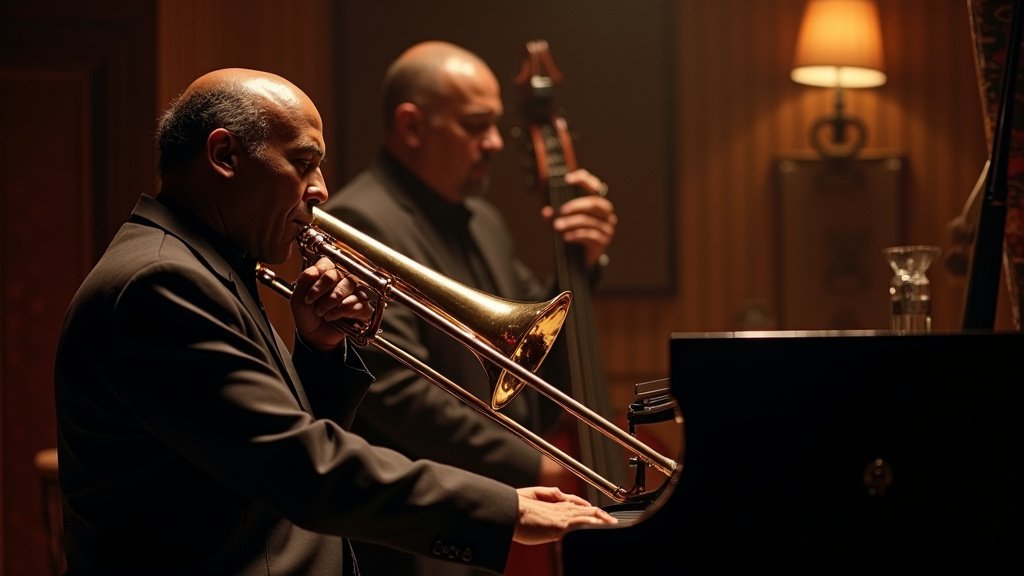Trombonist Conrad Herwig has unveiled “Reflections–Facing South,” a groundbreaking new trio album that boldly reimagines the landscape of Latin jazz. This release, a collaboration with the venerable pianist Eddie Palmieri and the dynamic bassist Luques Curtis, features an intentionally drumless configuration, presenting an energetic, raw, and rhythmically inventive sound that redefines the genre’s possibilities. The album, released on Savant Records, is available in multiple formats, including CD and high-resolution audio.
A Legacy in Three Voices
“Reflections–Facing South” arrives with profound poignancy, marking one of the final recordings of the legendary Eddie Palmieri, who passed away on August 6, 2025. Palmieri, an icon whose influence on salsa and Latin jazz is immeasurable, joins Herwig, a trombonist celebrated for his adventurous spirit and deep immersion in Afro-Caribbean music. The trio is completed by Luques Curtis, a highly sought-after bassist known for his virtuosic technique and profound musicality, who has collaborated with Palmieri extensively. This project represents a culmination of their shared artistic journey, a reflection on a lifetime of work for both Herwig and Palmieri.
Herwig, a multiple Grammy nominee, has built a celebrated career on his “Latin Side” series, which has consistently paid homage to jazz giants by reinterpreting their compositions through a Latin jazz lens. His extensive experience includes decades of performing and recording with luminaries across both jazz and Latin music, from Clark Terry and Miles Davis to Tito Puente and Paquito D’Rivera. Palmieri, a two-time Grammy winner, is credited with reshaping Afro-Caribbean music with his rhythmic ingenuity and harmonic daring, blending mambo, salsa, and jazz into a unique, potent style. Curtis, a rising force on the bass, has established himself as a vital collaborator, performing with artists such as Gary Burton, Christian Scott, and Ralph Peterson Jr., and co-founding the Truth Revolution Records label.
The Drumless Innovation: Rhythm Reimagined
The most striking aspect of “Reflections–Facing South” is its deliberate omission of a drummer. In a genre as rhythmically driven as Latin jazz, this is an almost unheard-of move. Instead of relying on a conventional drum kit, the trio’s members collectively generate the album’s pulsating energy and intricate rhythmic framework. Bassist Luques Curtis shoulders a significant responsibility, not only providing the harmonic foundation but also driving the percussive elements of the music. Palmieri’s piano playing becomes a rhythmic powerhouse, employing his signature percussive style to create complexity and excitement, much like a percussion instrument itself. Herwig’s trombone lines weave through this intricate tapestry, interacting dynamically with the piano and bass to create a sound that is both raw and sophisticated. This innovative approach allows for a greater sense of space, intimacy, and direct musical dialogue, making every note count.
The album’s nine tracks, including compositions by both Herwig and Palmieri, traverse a variety of moods and styles, from the tango-infused title track “Reflections–Facing South” to more tender boleros and bluesy explorations. Pieces like “Bianco’s Waltz” and “C’mon (Mi Guajira)” showcase the trio’s ability to establish a strong groove and intricate counterpoint without a drummer. The music is described as energetic, raw, and rhythmically inventive, offering a fresh perspective on latin music.
Critical Reception and Artistic Significance
“Reflections–Facing South” has been met with considerable acclaim, lauded for its daring artistic vision and the exceptional chemistry between its three master musicians. Critics highlight the album’s ability to capture the intoxicating rhythms and beautiful melodies of Latin jazz without relying on conventional instrumentation. The release is seen not only as a testament to Herwig’s ongoing innovation but also as a poignant final chapter in Eddie Palmieri’s extraordinary legacy. It serves as a reminder that musical innovation can thrive on subtraction as much as addition, proving that sometimes less is indeed more in the creation of profound musical experiences. The album’s significance lies in its challenge to established norms within the genre, offering a compelling glimpse into the evolving possibilities of Latin jazz and contemporary music. It is an essential listen for fans of modern Latin jazz and a powerful demonstration of how tradition and innovation can coalesce into something truly electrifying. Reviews of the album underscore its unique sound and the collaborative brilliance of Herwig, Palmieri, and Curtis.

























